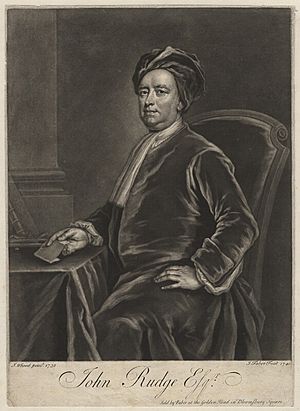John Rudge (banker) facts for kids
John Rudge (born August 15, 1669 – died March 22, 1740) was an important person in London. He was a successful merchant and financier, which means he dealt with money and trade. John Rudge was also a politician who served in the House of Commons (like today's Parliament) for many years, from 1698 to 1734. He even became the Governor of the Bank of England from 1713 to 1715.
Contents
John Rudge's Early Life and Family
John Rudge was born in 1669. He was the oldest son of Edward Rudge, who was also a merchant in London. His mother was Susanna Dethick.
John's father bought a large estate called the manor of Evesham in 1664. His father also represented Evesham in Parliament. John Rudge followed in his father's footsteps. In 1691, he was chosen as the Mayor of Evesham. When his father passed away in 1696, John inherited the Evesham Abbey estate. He married Susanna Letten in 1699.
John Rudge's Business Career
After his father died, John Rudge quickly took over the family's trading businesses. He became a very important person in the City of London, which is the financial heart of the city. He was involved in trade across the Mediterranean Sea. He also lent money to important officials.
In 1696, he joined the Royal African Company and the East India Company. He invested a lot of money in the New East India Company in 1698. He also signed a petition with other merchants who traded with Portugal.
John Rudge was a director of the Bank of England for many years, from 1699 to 1711. He later became the Deputy Governor of the Bank of England from 1711 to 1713. Then, he was made the Governor from 1713 to 1715. After that, he continued to be a director until he died. He also served as the Deputy-Governor of the South Sea Company from 1721 to 1730.
John Rudge's Political Career
John Rudge was elected as a Member of Parliament for Evesham in 1698. He won the election again later that year. He was re-elected without opposition in 1701.
He lost his seat in Parliament in November 1701. This happened because of a money disagreement with his relatives in Evesham. However, he won his seat back in the 1702 English general election. He was not very active on important committees. This might have been because of his busy roles as a director of the Bank of England and the New East India Company.
He voted on important issues, like extending the time for taking an oath in 1703. In 1705, he supported a rule to stop trade with France.
Rudge was re-elected for Evesham in the 1705 English general election. He supported the government's choice for Speaker in 1705. He was not very active in this Parliament. His political views were not always clear.
He was re-elected again in the 1708 general election. He supported allowing people from Palatine (a region in Germany) to become citizens in 1709. He also voted to impeach (accuse of wrongdoing) Dr. Sacheverell in 1710.
He was re-elected as a Whig (a political party) in the 1710 British general election. By 1710, he had a lot of money invested in the Bank of England. His involvement led to him being elected as deputy-governor in 1711. This brought him into contact with important government officials.
In 1712, he represented the Bank at a meeting with the Treasury. His brother, Edward Rudge, was also appointed to a government position. In Parliament, John Rudge usually supported the Whig party. He voted against certain bills, like an amendment on the South Sea bill in 1711. He also voted against the French commerce bill in 1713.
He was re-elected again in the 1713 British general election. In 1714, he voted against expelling Richard Steele, a famous writer and politician, from Parliament.
John Rudge was re-elected as a Whig MP for Evesham in the 1715 general election. However, he voted against the government in almost every recorded vote during the reign of King George I. He was re-elected again in the 1722 British general election and the 1727 British general election. In the reign of King George II, his only recorded vote was against changing a law in 1734. He lost his seat in Evesham in the 1734 British general election.
Death and Legacy
John Rudge passed away on March 22, 1740. He had one son, Edward, and two daughters. He was buried in Wheatfield, Oxfordshire, where his son lived. His tomb was created by the famous sculptor Peter Scheemakers.
See also
- Chief Cashier of the Bank of England
 | Janet Taylor Pickett |
 | Synthia Saint James |
 | Howardena Pindell |
 | Faith Ringgold |


